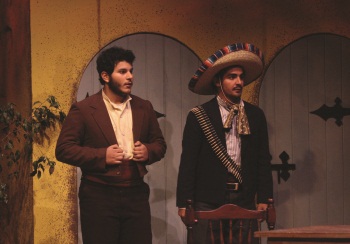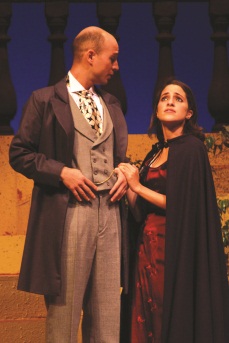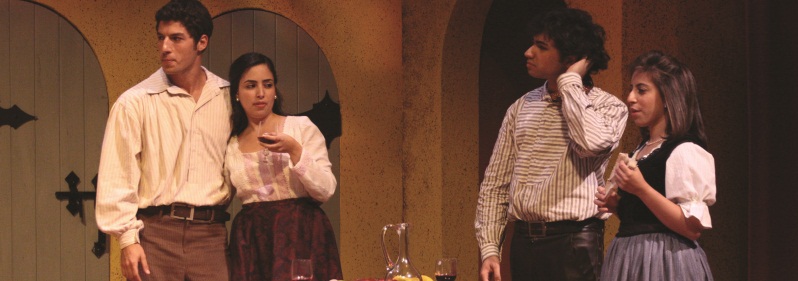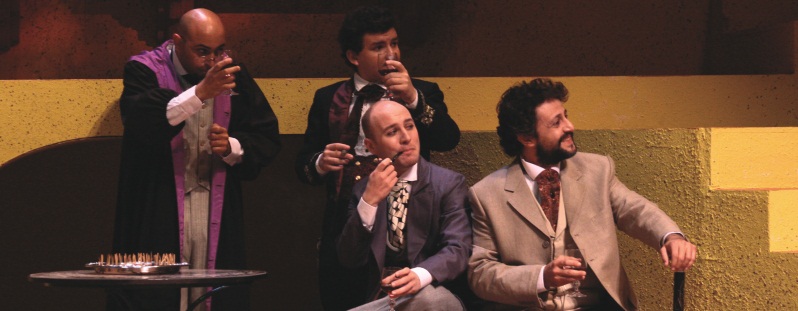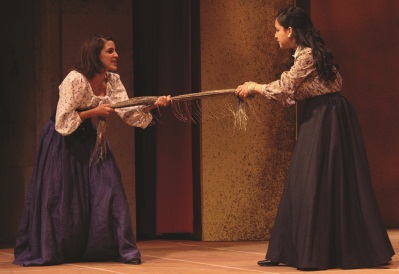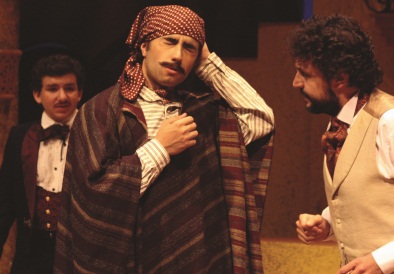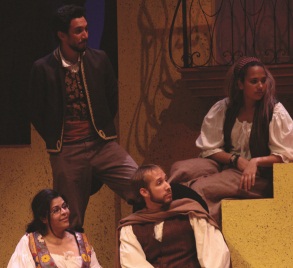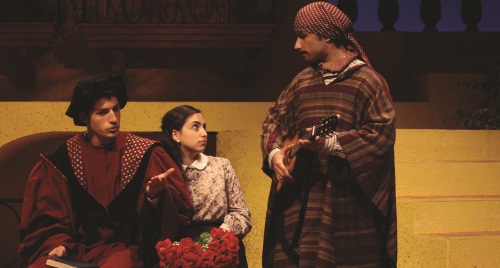AUC students and faculty draw audiences in their
Aluminous stage with Spanishstyle architecture towered ahead as students and alumni prepared to stage William Shakespeare’s The Taming of the Shrew in the Malak Gabr Arts Theater at AUC New Cairo. A guitarist emerged rounding out the ambience of the Spanish southwest and setting the stage for the action-oriented farce. As the play opened, viewers were presented with two plotlines surrounding the beautiful and wealthy daughters of a prosperous nobleman: the strong-willed and volatile Katherina, the shrew, and her eventempered younger sister, Bianca. The main story explores the marriage of Katherina, whose husband enacts a series of psychological torments to tame her into an obedient wife, depriving her of food, clothes and sleep. On the other hand, Bianca does not turn out to be the obedient angel that she originally portrayed. As a newlywed, she disregards her husband’s requests, and in the end, she is seen as the real shrew. In choosing to stage this performance, Leila Saad ’66, director of the play and performing and visual arts professor, explained that the story is liable to different interpretations about issues such as gender roles, marital responsibilities and sibling rivalry. “The play is immortal,” she said. “It is the beginning of the battle of the sexes.”
Critics find the play controversial in its incorporation of misogynistic elements that include subduing the dominant and outspoken female lead character into a weak and subservient wife. Unlike in Shakespeare’s original work, however, Saad suggests that by the end of the play, Katherina has not completely changed but is merely being more strategic. “Katherina does not have to be viewed as a victim, but rather a smart woman who recognizes a challenge and can turn it around,” she noted. “That is incredibly appealing in this age.” In the AUC production, several parts that were designed for male actors were portrayed by females. “Because there were more females available, I had to change a number of parts,” Saad explained. “In doing so, it showed that gender roles in this play were more fluid than traditionally interpreted.” With a 20-member cast that included students, seasoned veterans and those new to the stage, Saad saw this production as a unique learning opportunity. “For those new to theatre, there was a lot of coaching of the basics, but it paid off. That is what educational theatre is; it allows them to grow from a solid foundation,” she said. “For the students who had previous training, we were able to take it to a whole new level.” Presenting multidimensional characters and complex themes in an amusing way was only part of the learning experience. Students further developed as they struggled to decipher Shakespearean language that was rife with jokes and innuendo that they did not always immediately understand. “It took two months of preparation; we spent weeks just getting the language down,” said Noha Gaafar, a theatre major who played the role of Bianca. “We first paraphrased text into our own words until we felt comfortable with the physical elements of the play, and later we added the Shakespearean dialogue. We also watched a lot of videos of other performances and ones that focused on how to speak Shakespearean English because it was important for us to sound authentic.” Echoing the same sentiment, Alaa Shafei, a senior majoring in international law and minoring in business and theatre who played the role of Bianca’s husband, said, “The greatest challenge in performing a Shakespearean play is that the language is unusual. However, because his writing leaves a lot to interpretation, we are able to access it and make it relatable to our generation.”
Even the costumes lent themselves to creativity and interpretation. Although the original play takes place in the Italian city of Padua, the AUC production was set in the Spanish- American California of the 1860s. “Because of that, there was never an intention to set the play with Elizabethan clothes,” explained Jeanne Arnold, director of the theatre program. “I had to do research into what the world of the play would be in that context. I looked at the influence of the European Spanish in California as well as the Mexican Revolution in order to create a realistic concept of the people who might have lived during that time period.” Moments of physical comedy, where characters raced around stage, assailed one another, and even danced tango in one scene accompanied the dialogue and helped the performance remain entertaining. “Because of the stage combat and dance, the rehearsal process was much longer than the usual,” explained Dahlia Abou Azama, a business administration and theatre senior who played Katherina. “We spent five to six hours a day rehearsing, and at times it was difficult because most of us had classes during the day.” Despite these obstacles, the cast thoroughly enjoyed the experience. For many of them, it was their last performance as undergraduates at AUC. “I was working with people I have known for a long time and others who were new to theatre, and it was a challenging and fruitful learning experience,” said Gaafar. “I was excited to perform it as my senior capstone project.”
|
|||||||
